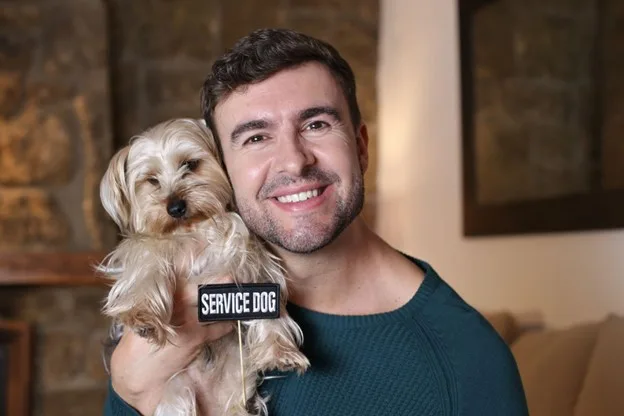Service dogs are starting to be used for more and more kinds of therapy for an increasing number of conditions. Service dogs are now becoming more available to people who need autism support. If you or a loved one has autism and is looking for alternative therapeutic options, a service dog might be a good option.
In this guide, we’ll walk you through some of the most frequently asked questions people have about autism service dogs.
 Autism Service Dog Training
Autism Service Dog Training
Service Dog vs ESA
Many people with a wide variety of mental health conditions, including autism, have ESAs or emotional support animals. An emotional support animal usually starts its life as a pet and transitions into a more emotionally supportive role for one of their owners.
ESAs can undergo training, be recommended by a doctor, and have an ESA ID card. However, they are not considered service dogs and are therefore not protected by the ADA or Americans with Disabilities Act. This act ensures people with disabilities are given the accessibility they need to enjoy a full life.
Trained service dogs are allowed to go anywhere you go, and unlike ESAs, you will not be charged pet fees to bring them with you to hotels, on an airplane, or at rental accommodations. Housing with pet-free policies are required to make an exception for service animals and cannot charge you any extra for having one.
How to Get an Autism Service Dog
There are many benefits to having a service dog, but you will need to get some official documentation to back them up. Misrepresenting a pet who is not properly registered is considered a crime, so to enjoy the benefits of your dog being recognized as a service animal, it’s worth it to go through the proper procedures.
To qualify for an autism service dog, you must have an official diagnosis by a medical professional. The service dog must be trained to help support your condition by assisting you in some demonstrable way. Your service dog also must be trained to handle many public situations.
After training, a service dog will take a Public Access test to ensure they can perform essential tasks around strangers.
Autism Service Dog Agencies
The traditional route is to apply to an agency that specially trains dogs to be autism service dogs. These agencies give rigorous professional training to the dogs and usually offer a guarantee of the dog’s performance.
The downside is that these agencies often have long waitlists. They can only train so many dogs at a time. Besides that, training is expensive. While most agencies are non-profits that work to offset the costs of training, it can still cost hundreds or thousands of dollars. Sometimes you need to put down a deposit simply to get on the waitlist for a dog.
Sometimes too, these agencies are geared toward matching children with autism service dogs to help them thrive in a school environment. This can mean it’s harder to have your needs met if you are a working adult with autism.
How to Train an Autism Service Dog
The alternative, if an agency dog isn’t the right fit for you, is to undertake training your own service dog. The ADA does not require service dogs to have professional training as long as they can meet the requirements described above.
Service dog training can happen at home with the help of an online course. Online courses led by training professionals are much less expensive but give you the guidance you need to prepare your dog to be an autism service dog.
If you follow the course material and check in with the support trainer regularly, your dog can pass their final test and become a certified service dog.
A Few Tips for Service Dogs
Making the transition from house pet to service dog is not right for every canine. Make sure your dog is a good candidate by evaluating how well they learn new commands, how loyal they are to you, and how they handle being around strangers and other animals.
If your current dog doesn’t fit the bill, you may want to consider adopting one of the dog breeds commonly considered best to serve as an autism service dog. Poodles, German Shepherds, and Beagles are just a few of the recommended breeds.
With a younger dog, they are more likely to take well to the training and have essential commands become ingrained. Even if you decide adopting a new dog is the better route, training them from home will still save you a lot of money, particularly if you adopt from a local animal shelter.
Train Your Own Autism Service Dog
If you think an autism service dog would be beneficial to you or a loved one, we hope you’ll consider an online training program. These service dogs can be very beneficial, but they aren’t always easily accessible to the people who need them the most. Thankfully, you can train your dog from home to meet the service dog criteria so they can have the legal protection to help you in every facet of life.

 Autism Service Dog Training
Autism Service Dog Training